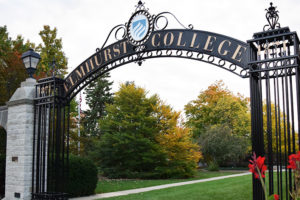
Several studies over the last 30 years have concluded that biology plays a significant role in sexual orientation; but it doesn’t mean that individuals are born with a “gay gene,” or that there is any other single determinant of a person’s sexual orientation, said noted author and neuroscientist Simon LeVay.
During an October 9 talk at Elmhurst College, LeVay discussed research supporting the notion that sexual orientation is due mostly to biological factors, such as genes and sex hormones, and is not a lifestyle choice. He also reflected on whether the science ultimately should matter in how society treats sexual minorities.
LeVay, who is gay, was working as a neuroscientist at Harvard Medical School and the Salk Institute for Biological Studies when his partner died of AIDS in 1990. In an interview before his lecture, LeVay said his partner’s death left him at a “crossroads of my life. My identity as a gay man became more important to me.“
This led LeVay to start researching sexual orientation. He noted a study conducted by UCLA in the late 1980s which found that a region of the brain known as INHA3 was larger in men than in women, evidence that sexuality was due in part to “some underlying biological differences in the brain,” LeVay said. He wondered if that also could be a reason for differences in sexual orientation, so he did his own study in 1990 and found there were structural differences in the brains of gay and straight men.
A key finding of his research, published in 1991, was that the INHA3 region of the brain in gay men was less than half the size of those in straight men and about the same as in women. That established a biological difference between straight and gay men, though it does not prove existence of a gay gene, LeVay told an audience of about 250 in the Founders Lounge.
“People often interpret my research to mean that being gay is genetic because people think there are only two possibilities in life: One is genes and the other is the environment.” That is not exactly right, he said. “There are genes, and there are other biological processes that are not controlled by genes, like sex hormones circulating in the womb.”
Biological processes such as fetal sex hormones may be more significant in forming brain structure than genes, he said, and the causes of hormonal differences are unknown. Moreover, hormones are subject to “a lot of random processes” that he likened to “dice-throwing,” meaning the outcome is not predictable.
Still, if a “gay gene” ever is identified, LeVay worries what society will do with the knowledge. Will parents try to remove “gayness” when they discover that their unborn child has it?
“We are going to have this power over our own natures, particularly over our children’s natures,” he said. “What we do with these choices is going to be one of the major ethical questions of this century. Are parents going to have free reign, or should society step in?”
Though several studies have linked genes and hormones to sexual orientation, LeVay cautioned that because of the random variability of biology processes, there may not be one dominant, deterministic cause.
“So it may not be that we’ll ever exactly understand why one particular individual became gay,” said LeVay, who has written 11 books, including Gay, Straight and the Reason Why and the College textbook Human Sexuality.
Scientific research is helpful because it counters claims that being gay is a lifestyle choice that can be changed through therapy and counseling, he said. However, the science should not be the only reason why society should fully accept gay people.
“I do worry that a lot of people try to hang too much on the science in terms of its possible effect on issues like gay rights and gay marriage,” he said. “I kind of wish that people would think more about issues like human rights and their freedom to fulfill themselves.”
LeVay’s talk was the second annual William R. Johnson Intercultural Lecture. The Johnson Lecture was established in 2011 in honor of the Reverend Dr. William R. Johnson ’68, vice president for member relations at the Council for Health and Human Service Ministries of the United Church of Christ. In 1972, he became the first openly gay person in modern history to gain ordination to the mainstream Christian ministry.